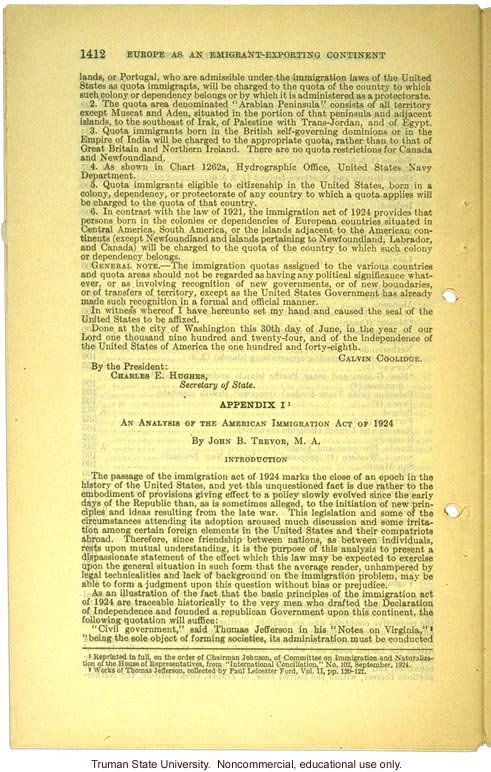"Europe as an emigrant-exporting continent," Harry H. Laughlin testimony before the House Committee, including Immigration Restriction Act (14)

"Europe as an emigrant-exporting continent," Harry H. Laughlin testimony before the House Committee, including Immigration Restriction Act (14)
1154. 1412 Europe as an Emigrant-Exporting Continent lands, or Portugal, who are admissible under the immigration laws of the United States as quota immigrants, will be charged to the quota of the country to which such colony or dependency belongs or by which it is administered as a protectorate. 2. The quota area denominated "Arabian Peninsula" consists of all territory except Muscat and Aden, situated in the portion of that peninsula and adjacent islands, to the southeast of Irak, of Palestine with Trans-Jordan, and of Egypt. 3. Quota immigrants born in the British self-governing dominions or in the Empire of India will be charged to the appropriate quota, rather than to that of Great Britain and Northern Ireland. There are no quota restrictions for Canada and Newfoundland. 4. As shown in Chart 1262a, Hydrographic Office, United States Navy Department. 5. Quota immigrants eligible to citizenship in the United States, born in a colony, dependency, or protectorate of any country to which a quota applies will be charged to the quota of that country. 6. In contrast with the law of 1921, the immigration act of 1924 provides that persons born in the colonies or dependencies of European countries situated in Central America, South America, or the Islands adjacent to the American continents (except Newfoudland and islands pertaining to Newfoundland, Labrador, and Canada) will be charged to the quota of the country to which such colony or dependency belongs. General Note. - The immigration quotas assigned to the various countries and quota areas should not be regarded as having any political significance whatever, or as involving recognition of new governments, or of new boundaries, or of transfers of territory, except as the United States Government has already made such recognition in a formal and official manner. In witness whereof I have hereunto set my hand and caused the seal of the United States to be affixed. Done at the city of Washington this 30th day of June, in the year of our Lord one thousand nice hundred and twenty-four, and of the independence of the United States of America the one hundred and forty-eighth. Calvin Coolidge. By the President: Charles E. Hughes, Secretary of State. Appendix I[superior]1[end superior] An Analysis of the American Immigration Act of 1924 By John B. Trevor, M. A. Introduction The passage of the immigration act of 1924 marks the close of an epoch in the history of the United States, and yet this unquestioned fact is due rather to the embodiment of provisions giving effect to a policy slowly evolved since the early days of the Republic than, as is sometimes alleged, to the initiation of new principles and ideas resulting from the late war. This legislation and some of the circumstances attending its adoption aroused discussion and some irritation among certain foreign elements in the United States and their compatriots abroad. Therefore, since friendship between nations, as between individuals, rests upon mutual understanding, it is the purpose of this analysis to present a dispassionate statement of the effect which this law may be expected to exercise upon the general situation in such form that the average reader, unhampered by legal technicalities and lack of background on the immigration problem, may be able to form a judgment upon this question without bias or prejudice. As an illustration of the fact that the basic principles of the immigration act of 1924 are traceable historically to the very man who drafted the Declaration of Independence and founded a republican Government upon this continent, the following quotation will suffice: "Civil government," said Thomas Jefferson in his "Notes on Virginia," [superior]2[end superior] "being the sole object of forming societies, its administration must be conducted [rule] [footnote text] [superior]1[end superior] Reprinted in full, on the order of Chairman Johnson, of Committee on Immigration and Naturalization of the House of Representatives, from "International Conciliation," No. 102, September, 1924. [superior]2[end superior] Works of Thomas Jefferson, collected by Paul Leicester Ford, Vol. 11, pp.120-121.
- ID: 11133
- Source: DNALC.EA


